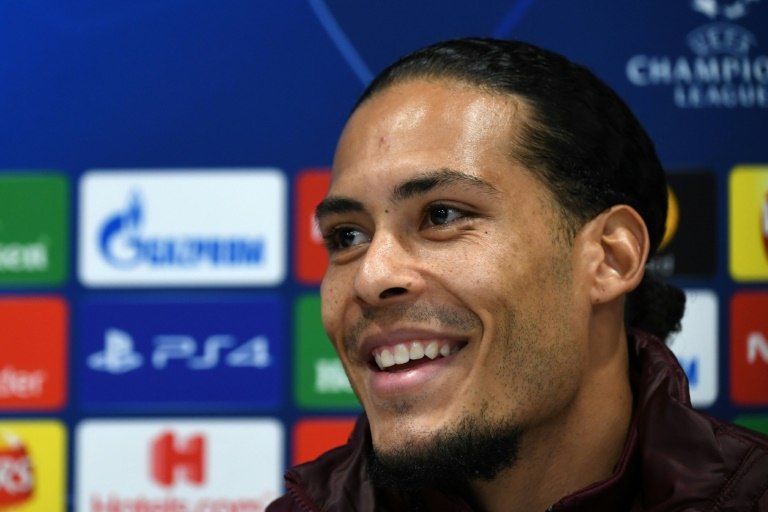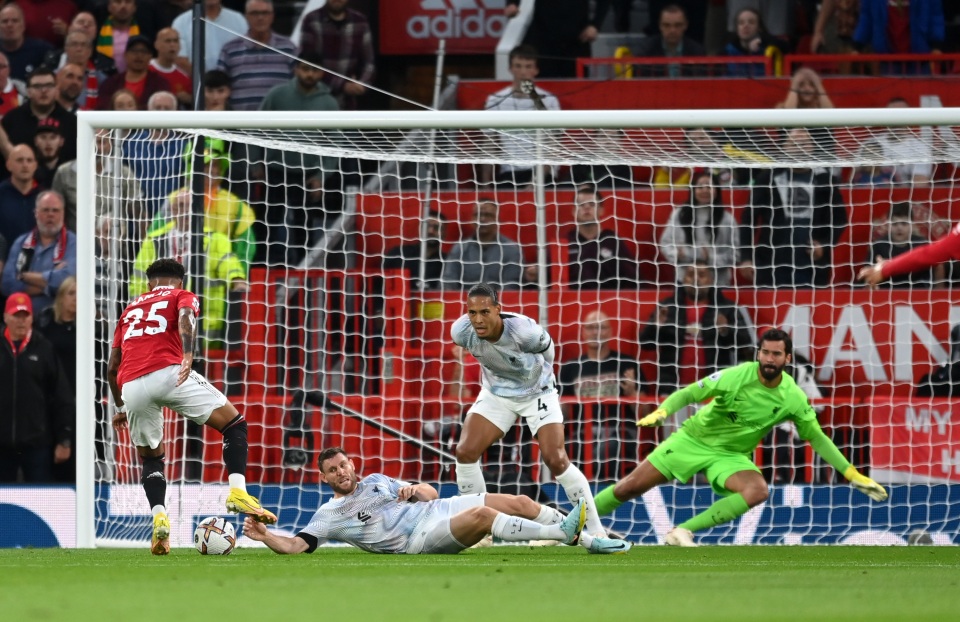His error against Manchester United has once more led many to question just how good the Dutch centre-back really is, as well as his standing in the pantheon of the all-time great defenders
It is impossible, in this age of social media, to go more than 24 hours without someone dredging up the tired, impenetrable talking point: how would such-and-such player have fared in a different era?
This argument is invariably a dishonest one, as it is only used to prop up or denigrate said such-and-such. However, it is worth exploring just the same, even if doing so requires naively assuming good faith. Why? Because, following Liverpool’s defeat at Old Trafford on Monday night, the embers of the long-standing debate over Virgil van Dijk’s peculiar approach to defending have been fanned into a roaring bush fire.
The Dutchman is a polarising topic at the best of times, not least because of the media’s (and, let’s face it, many Liverpool fans’) inclination to insert him into discussions of the best defenders in Premier League history. Now, this perception has not come out of nowhere; whatever one thinks about the 31-year-old, it is impossible to claim that he has been anything less than transformative for the Reds since his arrival from Southampton in 2018.
ALSO READ: ‘Missing Mane’ – Mixed Reactions as Manchester United Resurrect from the dead to win Liverpool
Liverpool signing Darwin Nunez for £85 million means Jurgen Klopp no longer has an excuse
Liverpool’s winless start to the season vindicates Sadio Mane
His presence on Merseyside has coincided with the resurgence of Liverpool as a force in England and in Europe, and over time he has developed the sort of impregnable aura that actively dissuades strikers from having a go at him when opportunities present themselves. Remember Lautaro Martinez in the Champions League last season?
Of course, defending by demoralisation is not unique to Van Dijk; the greatest defenders in history grew, in time, to be larger than life, accruing reputations that transcended their actual actions on the pitch. Greatness is the catalyst of myth.
Unfortunately, part of the way the current generation processes greatness is by defaulting to rankings. All too often, people are quick to deploy terms such as “of all time” and “in history” when appraising players, an unfortunate habit considering such epochal terms are used as proxies for rather more mundane timeframes. (Good luck getting people to acquiesce to modest time qualifiers like “since I began to be conscious of football” though.)
And so, a lot of the resistance to the declaration of Van Dijk’s eminence is a response to the perceived over-the-top quality of that adoration. It’s escalation or, if you like, Newton’s third law.
However, that is not all there is to it.
There is a popular mental association of defending with grime, grit and wiliness. Since its function is to essentially limit the sport’s ultimate expression, to stymie beauty, defending presents as the antithesis of beauty and purity. It must, therefore, be ugly; it must claw and snarl and slobber, it must wallow in the muck and abase itself when necessary.

Van Dijk, a handsome, composed presence in the heart of the Liverpool defence, simply does not fit with this image. Standing at 194cm and wearing his hair in a neat bun, the Breda-born centre-back is the picture of casual ennui in his defending, seeming to roll his eyes at the inconvenience of it all. There are not enough still images of him with his face contorted, limbs askew, hair wild in the breeze, and shirt sullied, to assuage doubts as to his worth.
It also does not help that most volume metrics do not mark him out as a standout in traditional defensive categories such as tackling, interceptions, aerial duels. Instead, he held the rather dubious distinction of not being dribbled past for an extended period; dubious not only because, in this day and age, it is not always clear how different statistical algorithms define “dribbling”, but also because his covering brief often precludes the possibility of being bypassed with the ball anyway.
Sancho error provides a window on Van Dijk’s approach to defending
This brings us right around to the inciting incident of this piece.
For the opening goal of Manchester United’s win over Liverpool, Van Dijk hubbed hell for his decision to stand off goal scorer Jadon Sancho. The first to lay into him, interestingly, was his own teammate James Milner who, though a midfielder, had thrown himself at the feet of the United winger in a futile bid to prevent a shot. Manager Jurgen Klopp also weighed in afterward, and while he refrained from mentioning the £75m defender, the implication was clear. “There was only one player who tried to block it, let me say it like this,” he said, pointedly.

To blame Van Dijk solely for the goal, however, would be callous in the extreme, especially in light of the string of errors that led up to it. At various points in the move, better decisions and greater intensity from Trent Alexander-Arnold and Joe Gomez, to name just two, might have had a prophylactic effect. Still, it is undeniable that the Netherlands international did not put his best foot forward, and his contrite demeanour as Milner laid into him suggested he realised this.
So, it was an error of judgement in the moment. Those can happen to anyone, right? Why does it bear deeper discussion then?
Well, because it was not an isolated incident. It was not so much that Van Dijk failed to engage quickly as that he often fails to engage quickly. Defending by delaying until the very last possible moment is something with which he has come to be associated, and so his mistake on Monday night was less a momentary lapse and more an extreme demonstration of the pitfalls of his particular approach to defensive play. The goal, in the eyes of his doubters and traducers, was not just comeuppance for both the player and his supporters, but confirmation of his overly inflated status.
As with all things, the truth lies somewhere in the middle of the two extremes, and is easier to appreciate once one applies first principles. To begin with, what exactly is Van Dijk? He cannot be a bad defender, as Liverpool are manifestly weaker defensively without him, but is he a great one?
To understand Virgil Van Dijk, one has to defer to that pesky, grievously endangered word: context. In order to parse him, it is necessary to think of him as a product of his time. More than anything else, this is the age of logic in football. And Van Dijk is the centre-back for this age: his defending is entirely about logic.
It is easy to see why. The decision-making heuristic among centre-forwards in this era is based on rationality, with xG as its creed and spontaneity as its deadly sin. Order is what defines this era, and within that environment, Van Dijk is king. He defends not so much what is unfolding around him as what should unfold, and more often than not he is correct.
That is what, at the best of times, can make his defending seem effortless after the fact: like Dr Strange, he runs through the possibilities, and divines the likeliest route to success in a split second. It may come across as presumptuous in the moment, may even seem like a man tempting fate. When every nerve in the brain is firing off alarm warnings, Van Dijk has the ability to stick strictly to the script. Whereas defending has always been, at its core, a reactive discipline, he is the director, the emblem for proactive defending.
Even his predilection to wait until the last moment to intervene is rooted in cold logic. Time is an underappreciated tool in the arsenal of the defender. The passage of time sows doubt, allows for reinforcements to arrive, and introduces more variables for the forward – a divot, a inopportune stumble or tweaking of a muscle, a heavy touch.
Is it a crime to compare Van Dijk to the greats of bygone eras?
As Monday showed, this approach is not without risk. Its inherent flaw is that there is no concession to intuition and flair. It works on the assumption that the opponent will always do what is logical, and so does not account for moments when strikers go off script.
Now, those moments are relatively rare compared to previous eras, forwards being as they are coached and rehearsed within an inch of their lives. Still, they do happen. And when they do, Van Dijk can look bereft, like a pandiculating man stumbling out of bed and falling off the edge of the world.
This brings up right around to the thought that kickstarted this. The very reason trying to compare players across eras is foolhardy is that it is impossible to divorce people from the cultural context within which they exist. Every human being is a product of the era in which they developed, and the same is true of footballers.
Can a defender like Van Dijk, who seems willfully reluctant to engage in the dark, grubby arts of defending, actually be classed alongside the greats of bygone eras then? Does his seemingly passive mien preclude this?
The answer is very likely yes and no, respectively. If you were to transplant him into a different time, he would be a different person with a different decision-making process. You could just forgo all of that contextual guff and make him a time traveller,, in which case he would of course stick out like a sore thumb. However, that would work the other way as well: if you took the great defenders of yesteryear, put them in a time capsule and plopped them into the middle of a Premier League match in 2022, they would also suffer for the comparison. It’s not a one-way street.
So, the next time someone says that footballers had it tougher in sepia and so are automatically better, by all means acknowledge the challenges of that time. The balls were heavier, the pitches were worse, the tackles were fiercer, the nutrition and science were less advanced, and those short shorts must have chafed pretty badly. However, not only was the game was slower, but all of those disadvantages applied across the board as well.
Sure, strikers in the 1940s and 1950s played in a time when footballers smoked and ate swill; so did the defenders they had to face. Mudbaths made dribbling more difficult and hard reducers encouraged skill, but on account of the development of the game at that time, there was a lot more space to receive the ball and play in.
The quality (call it talent, God-spark, whatever) that led the greats of that era to transcend its unique limitations would no doubt assert itself in this: if Pele played had been born in 2000 and chose football as a career path, he would almost certainly be the best player in the world right now. Van Dijk, one of the great defenders of his day, would be one of the great defenders if he had been born 50 years ago.
Pulse





